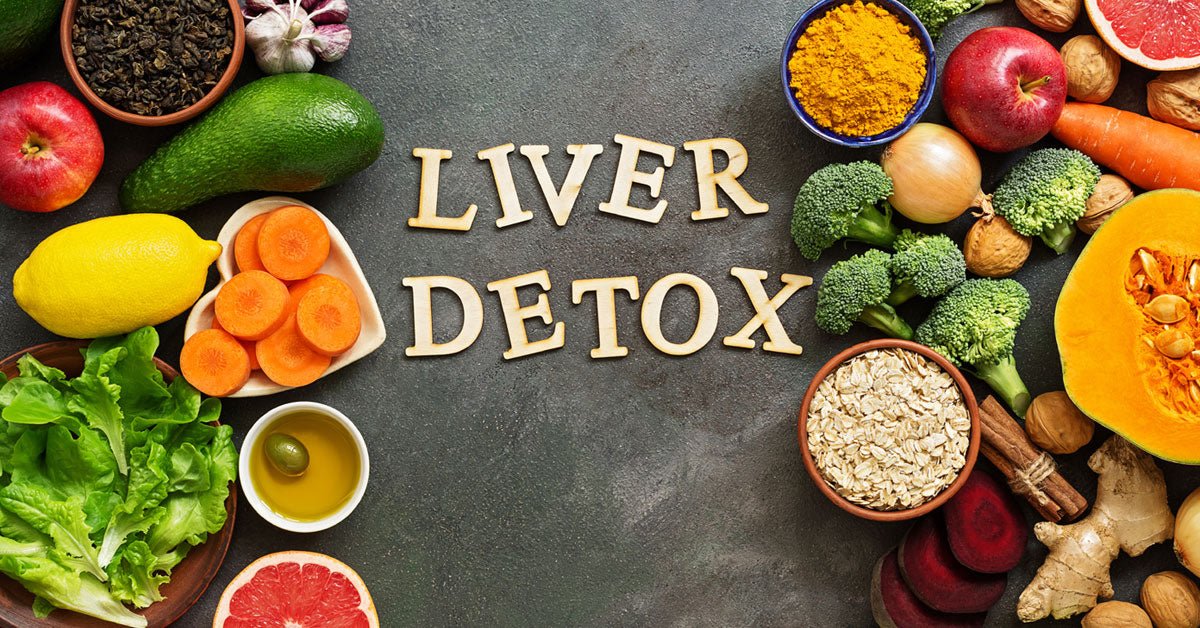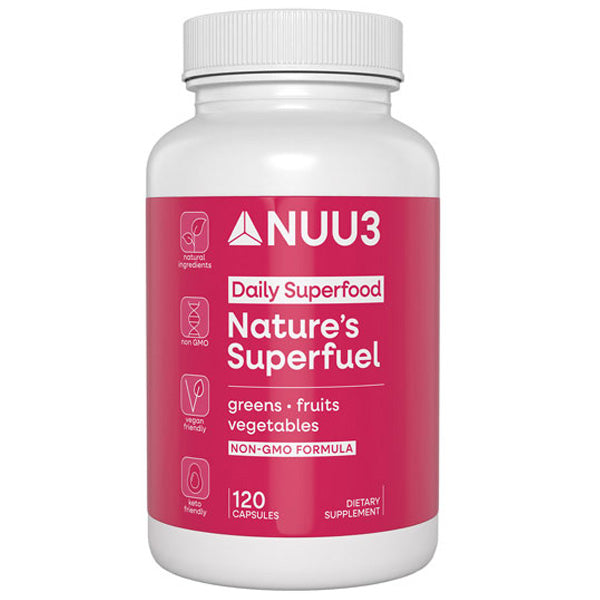The 8 Best Liver Detox Foods to Keep You Healthy

“Detox” is a buzzword that has been floating around social media for several years, however, it can be dangerous if you don’t approach it correctly. For example, avoid falling for marketing gimmicks and taking random liver detox supplements.
Instead, incorporate more liver detox foods into your diet, and consider taking a product backed by science. Read on to learn what detox is, the best lifestyle habits to support liver health, and a list of nutrient-rich foods that cleanse the liver. We’ll also cover the signs a liver detox is working.
What Is a Liver Detox?
Some people may argue that we don’t need to detox because our livers and kidneys both have a built-in detoxification system. Although, indeed, these organs work hard to eliminate metabolic by-products and other harmful toxins from the body, they can significantly benefit from additional support.
We experience exposure to an unprecedented number of environmental factors daily that could pose a health risk. The most common toxins we are exposed to include bisphenol-A (BPA), phthalates, pollution, heavy metals, and agricultural chemicals, and this increases the risk of illnesses[1] such as respiratory distress, cardiovascular disease, obesity, metabolic dysfunction, and neurodegenerative conditions.
Cleansing your liver involves supporting the health of your largest detoxification organ by following specific diet and lifestyle habits, and optionally, taking liver detox supplements. You can perform a basic liver cleanse by incorporating foods that supply your body with the nutrients necessary for phase I and II of detoxification.
Important cofactors for phase I of liver detoxification include Vitamins A, B2, B3, B6, B12, C, and E, folic acid, N-acetyl-cysteine (NAC), glutathione, and amino acids. Nutrients and cofactors[2] that support phase II liver detoxification and the neutralization of phase I reactive oxygen species byproducts include Vitamins A, B5, B12, C, and E, zinc, selenium, coenzyme Q10 (COQ-10), amino acids, and choline.
How Do I Know If I Need a Liver Detox?
These are the most common symptoms that indicate poor liver function[3]:
- Jaundice
- Enlarged liver
- Hypertension
- Mood swings
- Fatigue
- Weakness
- Nausea
- Loss of appetite
- Diarrhea
Other possible signs your liver may need support include hormonal imbalance, headaches, skin problems, and difficulty losing weight. However, these symptoms haven’t been extensively reported in the scientific literature yet. If you routinely experience any of these issues, consider incorporating foods that cleanse the liver into your diet.
What Are the Health Benefits of a Liver Detox?
There is limited scientific evidence about the health benefits of a liver detox or taking liver detox supplements, but we do know that the potential advantages are similar to following a healthy diet rich in vitamins, minerals, and phytochemicals[4]. These benefits include:
- Lowering blood pressure
- Reducing the risk of cardiovascular disease
- Lowering gastrointestinal disease risk
- Improving blood sugar control
- Promoting weight loss
- Improving vision
Although there is limited research on the benefits, there are signs a liver detox is working that you can look out for.
The signs a liver detox is working include:
- Clearer skin
- Improved energy levels
- Sharper mental focus
- Elevated mood
- Decreased bloating and gastrointestinal upset
- Weight loss
What Are the Best Liver Detox Foods?
The best liver detox foods include those abundant in the vitamins, minerals, amino acids, and phytochemicals that support the different phases of detoxification.
Here is a breakdown of some of the best liver cleanse foods.
-
Coffee and Tea: Coffee and various teas can support the enzymatic activity involved in phase I detoxification. Research5[5] shows that bioactive agents in these beverages such as polyphenols, ellagic acid, and chrysoeriol are beneficial for liver detoxification.
If you don’t enjoy coffee or tea, consider a supplement to get similar benefits such as the antioxidant-rich green tea blend NUU3 Green Pura. Not only does it support liver health, it boosts energy levels, strengthens the immune system, and improves heart health.
A 90-day double-blind, placebo-controlled study[6] on patients with non-alcoholic fatty liver disease (NAFLD) found that green tea extract significantly improved serum enzyme levels.
-
Berries: Berries are truly one of the best liver detox foods. They are rich in antioxidants like Vitamins A, C, and E, anthocyanins, and ellagitannins[7] which support phase I and II liver detoxification.
The antioxidants in berries help neutralize the reactive oxygen species that are natural byproducts of phase I liver detoxification. Consider adding more blueberries, blackberries, strawberries, raspberries, and cranberries to your diet.
-
Nuts: Nuts are a great way to support your liver, as they’re rich in healthy fats and antioxidants. A systematic medical review[8] deemed nuts a beneficial dietary intervention for Non-alcoholic fatty liver disease due to their ability to reduce low-density lipoprotein (LDL) cholesterol and fasting glucose while improving satiety and weight control.
Nuts are also a great liver cleanse food due to their high fiber content. Research[9] shows that higher dietary fiber intake is associated with a lower risk of liver disease. The fiber content in nuts can help eliminate toxins through the bowel.
-
Cruciferous Vegetables: Like berries, cruciferous vegetables are considered one of the best liver detox foods. They contain sulfurous compounds called glucosinolates, which the human body transforms into isothiocyanates and indoles. These derivates support phase I and II liver detoxification enzymes and exert antioxidant activity.[10]
Cruciferous vegetables you should consider adding to your diet include broccoli, cauliflower, bok choy, green cabbage, red cabbage, brussels sprouts, radish, watercress, and arugula.
-
Grapefruit: Grapefruits also support liver health, as they contain the powerful flavonoids naringin and naringenin. One study[11] showed that naringenin can protect the liver from injury and hepatic fibrosis.
-
Alternative Grains: The term “alternative grains” refers to grains that are more nutrient-dense than the well-known wheat, corn, and rice including amaranth, buckwheat, millet, oats, quinoa, and sorghum.
Compared to refined grains, alternative grains are higher in protein, fiber, vitamins, and minerals. The fiber content of alternative grains makes them great liver cleanse foods that may be especially helpful for NAFLD. In one study[12], NAFLD patients who incorporated more whole grains into their diet demonstrated significant reductions in liver enzymes and blood pressure.
-
Olive Oil: Although high in fat, olive oil is a good liver cleanse food rich in monounsaturated fats, polyphenols, and antioxidants. Monounsaturated fats are healthy and may help reduce cholesterol.
One of the most well-studied polyphenols contained in olive oil is oleuropein and research[13] shows that extra virgin olive oil (EVOO) and its polyphenol content have liver protective effects. EVOO may reduce hepatic steatosis, hepatocyte ballooning, fibrogenesis, and lipid peroxidation.
-
Spices: There’s evidence to indicate that certain spices, like turmeric and ginger, can support liver health. In an 8-week study[14] of patients with NAFLD, supplementation with a compound in turmeric called curcumin significantly reduced liver fat and enzymes.
Ginger contains potent plant compounds such as gingergols that reduce inflammation and protect the body from oxidative damage, making it an ideal spice for liver health. In a 12-week study[15] on patients with NAFLD, those who took 500mg of ginger powder daily had significant reductions in liver enzymes, C-reactive protein, and total cholesterol compared to the control group.
What Else Can You Do to Keep Your Liver Healthy?
In addition to incorporating foods that cleanse the liver, consider taking supplements and making other lifestyle modifications. The NUU3 Liver Health 365 supplement could be a great addition to your liver health toolbox.
The formula contains scientifically-backed herbs and nutrients that support your hardworking liver and protect it from damage. Featuring artichoke leaf extract, dandelion leaf, and milk thistle seed, NUU3 Liver Health 365 promotes bile production and detoxification. Research[16] shows that silymarin, a compound in milk thistle, can reduce oxidative stress and protect liver cells from damage.
Another high-quality liver detox supplement is NUU3 Nature’s Superfuel, which contains whole-food ingredients rich in vitamins, minerals, and antioxidants that support phase I and II liver detoxification. Its liver-healthy nutrients include cabbage, cauliflower, broccoli, beetroot, carrot, strawberry, blueberry, and ginger powder.
NUU3 Nature’s Superfuel not only supports liver health, but it also boosts your energy levels, maximizes immune function, and promotes a healthy cardiovascular system.
Tips to Reduce the Risk of Liver Disease
You can reduce your risk of liver disease or failure[17] by following these tips:
- Limit alcohol intake
- Maintain a healthy weight
- Eat plenty of fruits and vegetables
- Exercise regularly
- Follow the recommended dosage instructions for medications, especially acetaminophen
- Limit exposure to agricultural chemicals
FAQs
These are the answers to commonly asked questions about liver detox supplements.
Do Liver Detox Drinks Work?
There is no scientific evidence showing the efficacy of liver detox drinks. Your liver and other detoxification organs require adequate levels of certain vitamins, minerals, and other nutrients to function optimally, and detox drinks are unlikely to meet these requirements.
Some detox drinks on the market that claim to help you lose weight quickly can be dangerous. You should always consult a doctor before trying any new product.
Do Liver Cleanses Help Your Liver Heal From Alcohol or Unhealthy Food?
Although a liver cleanse may not regenerate damaged liver cells from excess alcohol consumption or eating unhealthy food, it could prevent further harm. Some liver detox supplements and cleanses contain nutrients that reduce oxidative stress and inflammation to help prevent liver injury.
It’s important to look for a product that contains scientifically researched ingredients such as the ones we recommended in previous sections. Alternately, a “liver cleanse” can simply involve incorporating more foods that cleanse the liver into your diet.
For more specific guidance, review the section on “What Are the Best Liver Detox Foods?” in this article.
Does a Liver Cleanse Help You Lose Weight Safely?
There is no guarantee that a liver cleanse will promote weight loss, and some of the gimmicky detox programs or liver detox supplements that claim to help you shed weight fast may be dangerous. A liver cleanse could result in weight loss due to a higher intake of fruits and vegetables and a decrease in alcohol consumption.
Conclusion
You can improve the health of your liver and other organs by increasing your intake of fruits and vegetables, reducing your alcohol consumption, exercising regularly, and limiting exposure to environmental toxins. You can safely “detox” by incorporating more foods that cleanse the liver into your diet and following a healthy lifestyle.
Detoxing your liver doesn’t, and shouldn’t, involve quick fixes or dangerous products. If you are considering taking liver detox supplements, choose a safe, natural formula that contains scientifically backed ingredients and is free of chemical and artificial additives.
A product should never make you feel worse, so if you experience bothersome symptoms or you aren’t noticing signs of a liver detox working, discontinue immediately and consult with a doctor.
References
1] ↑https://www.ncbi.nlm.nih.gov/pmc/articles/PMC10218044/
2] ↑https://pubmed.ncbi.nlm.nih.gov/26026145/
3] ↑https://www.hopkinsmedicine.org/health/conditions-and-diseases/common-characteristics-of-liver-disease
4] ↑https://www.hsph.harvard.edu/nutritionsource/what-should-you-eat/vegetables-and-fruits/
5] ↑https://www.ncbi.nlm.nih.gov/pmc/articles/PMC4488002/#B23
6] ↑https://pubmed.ncbi.nlm.nih.gov/26955458/
7] ↑https://www.ncbi.nlm.nih.gov/pmc/articles/PMC5890122/
8] ↑https://www.ncbi.nlm.nih.gov/pmc/articles/PMC7693493/
9] ↑https://www.nature.com/articles/s41467-021-26448-9
10] ↑https://www.frontiersin.org/articles/10.3389/fnut.2020.00111/full
11] ↑https://www.ncbi.nlm.nih.gov/pmc/articles/PMC9647116/
12] ↑https://pubmed.ncbi.nlm.nih.gov/31685037/
13] ↑https://pubmed.ncbi.nlm.nih.gov/29141573/
14] ↑https://pubmed.ncbi.nlm.nih.gov/27270872/
15] ↑https://www.ncbi.nlm.nih.gov/pmc/articles/PMC6986243/
16] ↑https://link.springer.com/article/10.1007/s12325-020-01251-y
17] ↑https://www.mayoclinic.org/diseases-conditions/acute-liver-failure/symptoms-causes/syc-20352863













